|
|
|
Sort Order |
|
|
|
Items / Page
|
|
|
|
|
|
|
| Srl | Item |
| 1 |
ID:
099203


|
|
|
| 2 |
ID:
084690
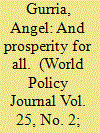

|
|
|
| 3 |
ID:
166562
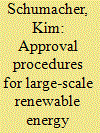

|
|
|
|
|
| Summary/Abstract |
This paper analyses the commonalities and variances of environmental approval procedures in four OECD territories, Japan, New Zealand (NZ), the European Union (EU), and the United States (US). In order to streamline regulatory approval frameworks for large-scale renewable energy (LS-RE) installations, outlining the strengths, as well as the weaknesses of the current systems in place, is crucial in determining what components to alter in line with national and regional particularities. The jurisdictional juxtaposition facilitates the identification of administrative burdens, which could increase environmental review-related costs for developers and prolong the entire approval process. Environmental impact assessment (EIA) frameworks, a major component of the LS-RE approval process, suffer from administrative fracturing between the local, regional, and national levels as well as between various government agencies. In combination with strong reservations from local civil society stakeholders, the results revealed some of the flaws of the current LS-RE project approval systems in place. The EIA frameworks and reform efforts in all four jurisdictions illustrate the importance of consolidated and comprehensive frameworks to reduce the amount of planning uncertainties for developers. Utilising regulatory tools such as mandatory timeframes, scoping, clear screening thresholds and priority assessment categories for LS-RE projects, could result in robust EIA processes based on unified regulatory procedures for climate change mitigating energy projects, inside as well as outside of OECD jurisdictions.
|
|
|
|
|
|
|
|
|
|
|
|
|
|
|
|
| 4 |
ID:
082933
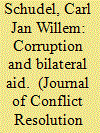

|
|
|
|
|
| Publication |
2008.
|
| Summary/Abstract |
Corruption in developing states reduces the effectiveness of foreign aid that is allocated to them, because government officials in corrupt countries use this money for private rather than public purposes. Despite this, existing studies do not find different aid policies from donor governments toward corrupt and less corrupt recipients. However, most of these studies have not taken account of variation among donor states. This is an important omission, because donor states behave differently. This article argues that the responsiveness of donor states to corruption in recipient states depends on their own level of corruption: less corrupt donor states allocate more aid to less corrupt recipient states than to corrupt recipients, whereas corrupt donor states do not make such a clear distinction. This proposition is tested by both pooled ordinary least squares and fixed effects estimations. The data support the argument that corruption levels in donor states determine their reaction to corruption in recipient states.
|
|
|
|
|
|
|
|
|
|
|
|
|
|
|
|
| 5 |
ID:
032930
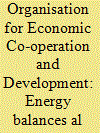

|
|
|
|
|
| Publication |
Paris, Oraganisation for Economic Co-operation and Development, 1976.
|
| Description |
507p
|
|
|
|
|
|
|
|
|
|
|
|
Copies: C:1/I:0,R:0,Q:0
Circulation
| Accession# | Call# | Current Location | Status | Policy | Location |
| 015679 | 333.79/OEC 015679 | Main | On Shelf | General | |
|
|
|
|
| 6 |
ID:
187248
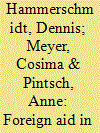

|
|
|
|
|
| Summary/Abstract |
Populist parties in governments are on the rise in many European countries that are also major donors of foreign aid. While the general political development of populism has attracted much scientific and media attention, there is little knowledge about how populist parties influence foreign aid spending. Since radical right-wing populism tends to over-prioritize domestic politics, populist radical right-wing governments are likely to reduce foreign aid spending. We argue that the larger the share of populist radical right parties in a government is, the less foreign aid is spent. We account for divisions of power by distinguishing between populist radical right parties in the legislative and executive branches of government. Analysing 25 OECD countries between 1990 − 2016 using generalized additive models, we find empirical support for our hypotheses. Our findings on foreign aid have implications for understanding the impact of populist radical right-wing parties on foreign policy making more broadly.
|
|
|
|
|
|
|
|
|
|
|
|
|
|
|
|
| 7 |
ID:
091721
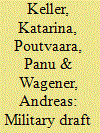

|
|
|
| 8 |
ID:
094967
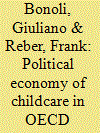

|
|
|
|
|
| Publication |
2010.
|
| Summary/Abstract |
If childcare policy has become topical in most OECD countries over the last ten years or so, actual developments display huge cross-national variations. Countries like Sweden and Denmark spend around 2 per cent of GDP on this service, and provide affordable childcare places to most children below school age. At the other extreme, in Southern Europe, only around 10 per cent of this age group has access to formal daycare. Against this background, this article aims to account for cross-national variations in childcare services. It distinguishes two dependent variables: the coverage rate and the proportion of GDP spent subsidising childcare services. Using a mix of cross-sectional and pooled times-series methods, it tests a series of hypotheses concerning the determinants of the development of this policy. Its main conclusion for the coverage rate is that key factors are public spending and wage dispersion (both positive). For spending, key factors are the proportion of women in parliaments (positive) and spending on age-related policies (negative).
|
|
|
|
|
|
|
|
|
|
|
|
|
|
|
|
| 9 |
ID:
176705
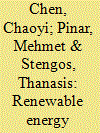

|
|
|
|
|
| Summary/Abstract |
The existing literature on renewable energy consumption and economic growth nexus produces mixed results as the effect of renewable energy consumption on economic growth can be either positive, negative or not significant. This paper examines the causal link between renewable energy use and economic growth by employing a threshold model using a 103-country sample in the 1995 to 2015 period. We find that the relationship between renewable energy consumption and economic growth depends on the amount of renewable energy used. Our results demonstrate that the effect of renewable energy consumption on economic growth is positive and significant if and only if developing countries or non-OECD countries surpass a certain threshold of renewable energy consumption. However, if developing countries use renewable energy below a given threshold level, the effect of renewable energy consumption on economic growth is negative. However, we also find that renewable energy consumption has no significant effect on economic growth in developed countries and a positive and significant effect on economic growth in OECD countries. The findings of this paper suggest that for developing countries to realize positive economic growth from their investment to renewable energy, they need to surpass a certain threshold of renewable energy consumption.
|
|
|
|
|
|
|
|
|
|
|
|
|
|
|
|
| 10 |
ID:
091514


|
|
|
|
|
| Publication |
2009.
|
| Summary/Abstract |
In the age of global supply chains and "just in time" logistics, fast and efficient goods movement is often seen as an economic imperative. Growth in global goods movement not only translates into growth in commercial trucking activity but also into growth in the share of trucking compared to other modes of in-country freight transportation. These trends have a significant impact on the energy intensity of freight transport. Using a bottom-up approach relying on national data, this study compares the energy intensity of truck freight in Australia, France, Japan, the United Kingdom and the United States from 1973 to the present.
|
|
|
|
|
|
|
|
|
|
|
|
|
|
|
|
| 11 |
ID:
083997
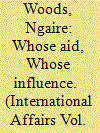

|
|
|
|
|
| Publication |
2008.
|
| Summary/Abstract |
Rising economies including China, the United Arab Emirates, Brazil, Korea, India, Kuwait and Saudi Arabia are subtly changing the rules of foreign aid with profound consequences for the role of multilateral institutions and conditionality. Fears abound that this new aid is bolstering rogue states, fuelling corruption, and increasing the debt burdens of poor countries. This article critically assesses these arguments before dissecting the attractions of emerging donors' aid against a background of established donors' failure to deliver on promises to increase aid, reduce conditionality, better coordinate and align aid efforts, and reform the aid architecture. It argues that a silent revolution is taking place whereby the emerging donors are not overtly attempting to overturn the rules of multilateral development assistance, nor to replace them. Rather, by quietly offering alternatives to aid-receiving countries, they are weakening the bargaining position of western donors. The resulting tensions underscore the urgency of reforming the multilateral aid system
|
|
|
|
|
|
|
|
|
|
|
|
|
|
|
|
|
|
|
|
|